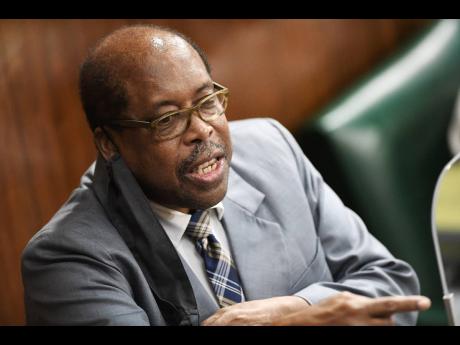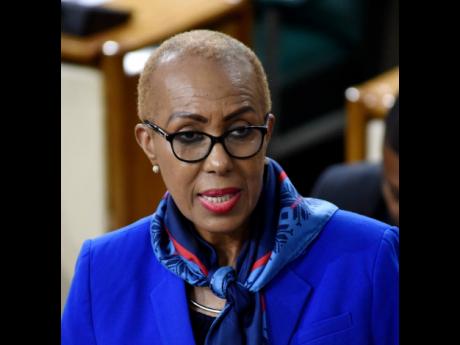A question of size
Parliamentary committee disputes numbers on Jamaica Teaching Council board
A PARLIAMENTARY committee was engaged in an intense debate yesterday on whether lawmakers should approve a large or smaller, efficient board to govern the proposed Jamaica Teaching Council. However, after extensive deliberations by a joint select...
A PARLIAMENTARY committee was engaged in an intense debate yesterday on whether lawmakers should approve a large or smaller, efficient board to govern the proposed Jamaica Teaching Council.
However, after extensive deliberations by a joint select committee reviewing the Jamaica Teaching Council Act, 2022, committee chair and education minister Fayval Williams indicated that there would be a 29-member board that would oversee the council.
The Jamaica Teaching Council is the body that will assess and grant licences to teachers in Jamaica under the proposed law.
Committee member and Member of Parliament for Trelawny Northern, Tova Hamilton, questioned the size of the board even as she called for a reduction in its number.
She argued that maintaining the size of the board “was a recipe for disaster”.
Chief executive officer of the current Jamaica Teaching Council (JTC), Dr Winsome Gordon, said she had no problem with the make-up and size of the board as there was a requirement for 60 per cent of the membership to be trained teachers.
“We would like the board to be at least 60 per cent of the profession,” she told the committee.
Solicitor General Marlene Aldred, who provides legal advice to the committee, said that she supported the suggestion made by Hamilton that a board of 29 was really too big.
She argued that a board of that size would not function in an effective manner.
The solicitor general invited the committee to look at the functions of the board that are set out in Clause 13 of the legislation.
FUNCTIONS AS STATED BY LAW
Clause 13 says the board shall be the governing body of the council and shall be responsible for implementing the policies and overseeing the general administration of the council.
The law also points out that the board shall ensure that the operations of the council are in conformity with the Financial Administration and Audit Act (FAA) and the Public Bodies Management and Accountability Act (PBMA) and any other law relevant to the management of public bodies.
Additionally, as part of its mandate, the board has the task to review, evaluate, approve, and monitor the council’s corporate policies; operational, strategic, annual business plan and other corporate plans; annual budget proposals and submissions, as well as financial statements.
“A board of 29 will not be efficient in getting these types of management matters done in the new fiscal responsibility framework that we now are all operating under,” Aldred reasoned.
While acknowledging efforts at keeping the size of boards small and manageable, Gordon said that because of the nature of education, these council boards are large, comprising up to 60 or more persons in some jurisdictions.
“In education, the stakeholder group is very wide and to have the teachers represented and to have the stakeholders represented then the council boards are big,” Gordon said.
However, Aldred noted that the stakeholder groups can still be represented with a much smaller board.
SERIOUS CONSIDERATION
She said that compared to some other jurisdictions, local boards have very specific legal responsibilities because of the country’s fiscal responsibility framework.
“I think this is something that the committee should really consider very seriously that the board can operate efficiently and carry out its functions, especially under the FAA and PBMA Acts,” Aldred said.
But Gordon insisted that buy-in is important, noting that when the board deliberates on a matter “you really want to have your stakeholders fully represented. So while accepting the challenges of a large board we also should consider the stakeholder group of the education system, it is very wide.”
Committee member and Member of Parliament for Manchester Central, Rhoda Crawford, contended that if the stakeholders in education wanted to be on the board of the council, they should be allowed to participate.
However, Hamilton wanted the records to reflect her dissent to a 29-member board.
Committee member Senator Lambert Brown said that he supports the case for a 29-member board made by Gordon.
“This is about participation and buy-in,” he said.
He quipped that “fiscal responsibility is not a good word in this last week, but it is not for that reason that I am with Dr Gordon”.
But Brown was stopped in his tracks by committee chairperson Williams, who sought to rebuke him for introducing “derogatory comments about other issues into this meeting”.
She urged Brown to make his contributions without political overtones.
However, Brown hit back, saying that he was not concerned if his remarks did not find favour with everyone.
“I speak my mind and my views, and that is why I am here, despite your effort to ask me to disinvite myself from the committee,” he said.
At the end of the discussion, Williams indicated that although the size of the board appears unwieldy on paper, she was satisfied that all the stakeholders are represented.


